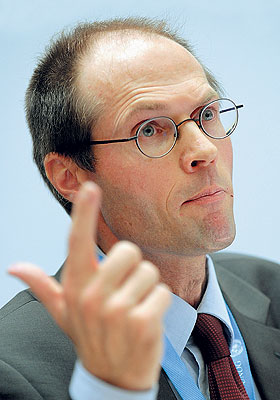UN expert says free trade won't solve food crisis
 Geneva - A United Nations' expert on food said Wednesday that free trade and greater liberalization won't help solve the problems of the nearly 1 billion hungry people in the world.
Geneva - A United Nations' expert on food said Wednesday that free trade and greater liberalization won't help solve the problems of the nearly 1 billion hungry people in the world.
"Trade is not a substitute for building the capacity of a country to feed it own people," Olivier De Schutter said, presenting the conclusions of his report on the World Trade Organization.
He admitted that a certain amount of international food commerce was needed, but that trade so far has not worked to combat hunger.
"The current system of international trade is a major reason for (the food) crisis we've seen," De Schutter noted, asking states to be better informed about the impact WTO trade negotiations will have on their hungry.
De Schutter also spoke about "food miles," and that the carbon emissions involved in transport, along with a reliance on agricultural methods which produced more greenhouse gases, were byproducts of international trade contributing to climate change.
He also warned that a small number of large agro-food companies were having a disproportionate influence on global policy, distorting it in their favour and excluding the larger number of smaller scale growers and, subsequently, the consumer needs in poorer countries.
Up to 80 percent of the world's hungry were involved in agriculture, either as farmers or labourers, De Schutter said.
The UN expert said poor countries specialized in a limited number of crops, such as coffee and cotton, for export, expecting cheap food prices to allow them to import as much as needed. When the cost of food skyrocketed, starting in 2006, many found themselves unable to feed their citizens.
His report favoured protectionist safeguard measures for poorer countries, so they could defend their markets and farmers from imports from industrialized nations.
Furthermore, part of what the richer nations were exporting included processed foods which were causing unprecedented medical issues in the developing world, including an explosion of diabetes cases.
Last week the WTO announced it would not convene a ministerial meeting for the Doha Round of trade talks, ongoing since late 2001, as member states could not agree on key issues, including divides on agricultural matters.
The United Nations World Food Programme (WFP) said this week it would need some 5.2 billion dollars in donor funding to provide aid to some 98 million hungry people in 2009.
Already, underfunding was hampering aid efforts in Zimbabwe, which is in the middle of a political and humanitarian crisis, a WFP official said.
A week earlier, the UN's Food and Agriculture Organization (FAO) announced that another 40 million people have been pushed into hunger this year primarily due to high food prices, bringing the total number of hungry to nearly 1 billion worldwide.
This increase comes after four decades of progress when the international community collectively helped to bring down the percentage of hungry people from 37 to 17.
De Schutter, who was appointed earlier this year, will present his full report to the UN's Human Rights Council in March. (dpa)